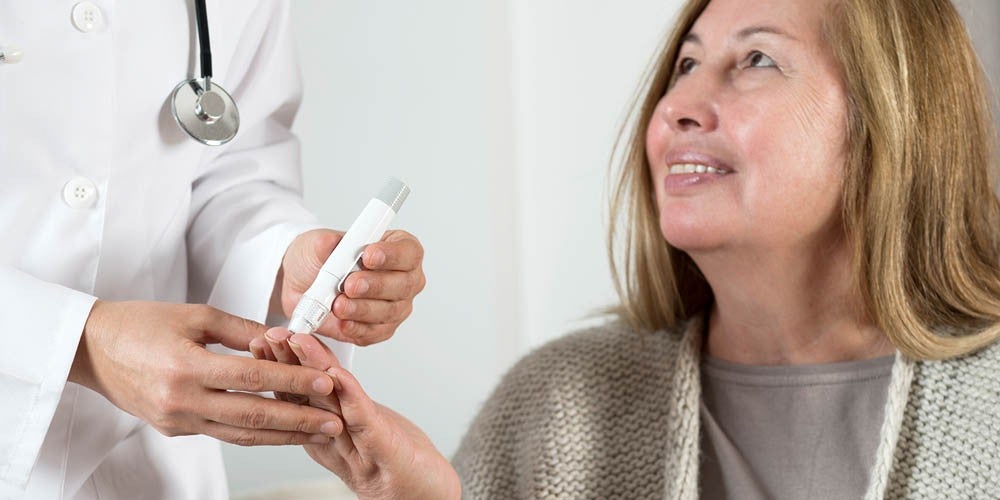Hypoglycemia: treatment and prevention

How is hypoglycemia treated?
Specific treatment for hypoglycemia will be determined by your healthcare provider based on:
- Your age, overall health, and medical history
- The extent of the condition
- Your tolerance for specific medicines, procedures, or therapies
- Expectations for the course of the condition
- Your opinion or preference
If you have diabetes, the goal of treatment is to maintain an appropriate blood sugar level. This involves testing blood sugar often, learning to recognize the warning signs of low blood sugar, and treating the condition quickly, based on prior instructions from your healthcare provider.
To treat low blood sugar immediately, you should eat or drink something that has concentrated sugar in it, such as orange juice, or a hard candy.
If you do not have diabetes, your healthcare provider may advise:
- Eating smaller meals, more often
- Eating healthy snacks between meals
- Eating a variety of healthy foods
- Exercise regularly
- Check blood sugar more often, especially when exercising
If left untreated, hypoglycemia can get worse and cause confusion, clumsiness, or fainting. Severe hypoglycemia can lead to seizures, coma, and even death.
How can I prevent hypoglycemia?
If you have diabetes, your treatment plan should match the dose and timing of medicine to your usual schedule of meals and activities. Mismatches can result in hypoglycemia. For example, taking a dose of insulin—or other medicine that increases insulin levels—and then skipping a meal could result in hypoglycemia.
To help prevent hypoglycemia, people with diabetes should always consider the following:
Diabetes medicines. Your healthcare provider can explain which diabetes medicines can cause hypoglycemia and explain how and when to take medicines. For good diabetes management, take your diabetes medicines in the recommended doses at the recommended times. In some cases, healthcare providers may suggest learning how to adjust medicines to match changes in your schedule or routine.
Meal plans. A registered dietitian can suggest a meal plan that fits your personal preferences and lifestyle. Following this meal plan is important for managing diabetes. Eat regular meals, eat enough food at each meal, and try not to skip meals or snacks. Snacks are particularly important for some people before going to sleep or exercising. A dietitian can make recommendations for snacks.
Daily activity. To help prevent hypoglycemia caused by physical activity, healthcare providers may advise that you:
- Check blood glucose before engaging in sports, exercise, or other physical activity and having a snack if the level is below 100 milligrams per deciliter (mg/dL).
- Adjust medicine as needed before physical activity.
- Check blood glucose at regular intervals during and after extended periods of physical activity and having snacks as needed.
Alcoholic beverages. Drinking alcohol, especially on an empty stomach, can cause hypoglycemia, even a day or two later. Heavy drinking can be especially dangerous if you take insulin or medicines that increase insulin production. Only consume alcoholic beverages with a snack or meal at the same time.
Diabetes management. Intensive diabetes management — keeping blood glucose as close to the normal range as possible to prevent long-term complications — can increase the risk of hypoglycemia. If you wish to have tight control over your blood sugar, talk with your healthcare provider about ways to prevent hypoglycemia and how best to treat it if it happens.
When should I call my healthcare provider?
If you have a tendency to experience symptoms that resemble hypoglycemia, you may need to have your blood sugar tested by your healthcare provider.
Key points about hypoglycemia
- Blood sugar levels under 70 mg/dL are too low and reflect hypoglycemia.
- To treat low blood sugar immediately, eat or drink something that has sugar in it, such as orange juice or a hard candy. Avoid sweets that also contain fat like chocolate bars, as these can prevent your blood sugar from coming up quickly.
- Tight blood sugar control can increase the risk of hypoglycemia depending on which medications you use. If you wish to have tight control over your blood sugar, talk with a healthcare provider about ways to prevent hypoglycemia and how best to treat it if it happens.
Next steps
- Know the reason for your visit and what you want to happen.
- Before your visit, write down questions you want to be answered.
- Bring someone with you to help you ask questions and remember what your provider tells you.
- At the visit, write down the name of a new diagnosis, and any new medicines, treatments, or tests. Also, write down any new instructions your provider gives you.
- Know why a new medicine or treatment is prescribed, and how it will help you. Also, know what the side effects are.
- Ask if your condition can be treated in other ways.
- Know why a test or procedure is recommended and what the results could mean.
- Know what to expect if you do not take the medicine or have the test or procedure.
- If you have a follow-up appointment, write down the date, time, and purpose of that visit.
- Know how you can contact your provider if you have questions.
Was this article helpful?
Don't wait! Unlock a healthy, happy new year, at no cost to you.
This content is not intended to be a substitute for professional medical advice, diagnosis or treatment. Always seek the advice of your physician or other qualified health provider with any questions you may have regarding a medical condition.
